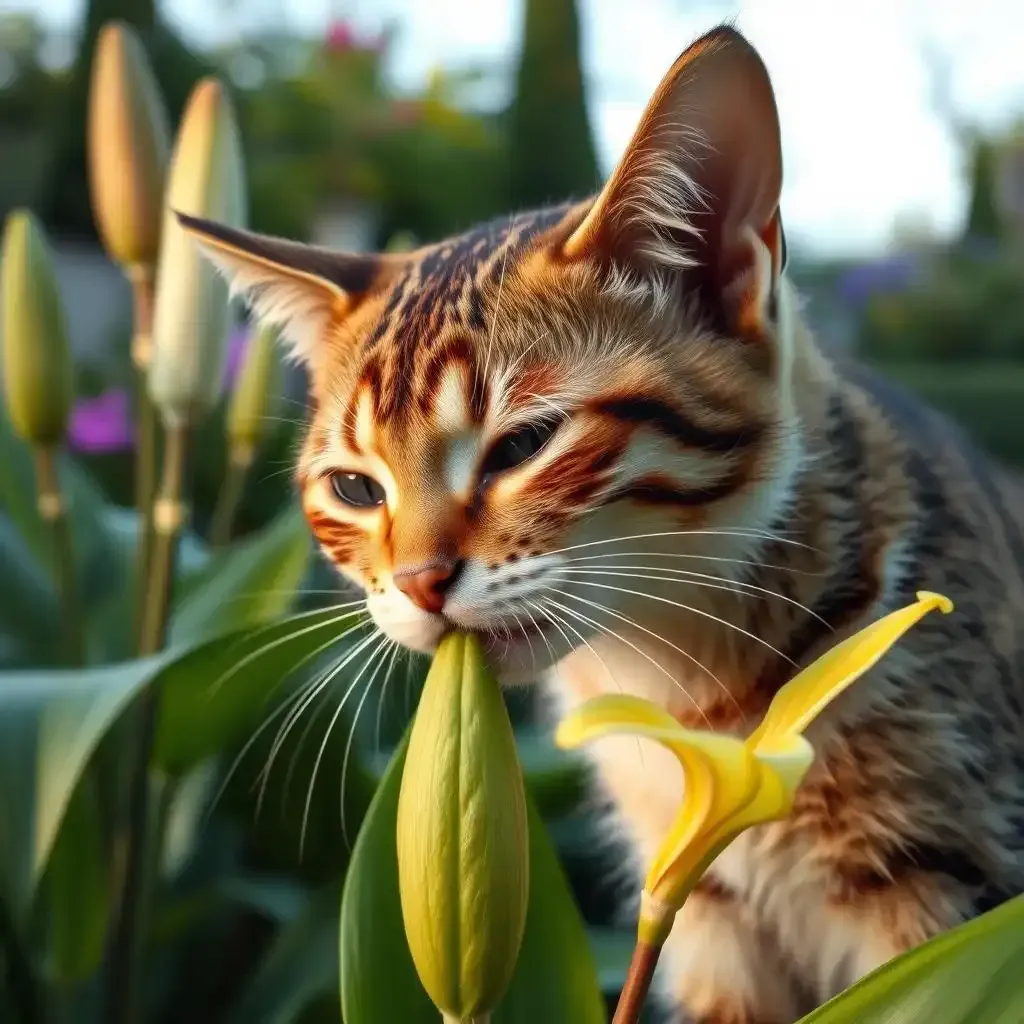Table of Contents
Gardening and pet ownership can be a harmonious combination, but it's essential to be aware of the potential dangers lurking in your plants. One such plant that has raised many eyebrows is the Tiger Lily. While it's a beautiful addition to any garden, its toxicity can pose serious risks to your pets. This article from lilyflower.homes will explore into the toxicity of the Tiger Lily, focusing on its effects on cats, dogs, and other animals. We'll also provide you with a list of safe and toxic lilies, along with practical tips to prevent poisoning. Whether you're a seasoned gardener or a new pet owner, this information is crucial for keeping your beloved furry friends safe.

Is Tiger Lily Poisonous? The Ultimate Guide For Pet Owners
Is Tiger Lily Poisonous to Cats?

Is Tiger Lily Poisonous To Cats
The Dangers of Tiger Lily for Cats
Tiger Lilies are a stunning addition to any garden, but they can be deadly for your feline friends. Ingesting any part of the plant, especially the bulb, can lead to severe health issues and even death. The symptoms of Tiger Lily poisoning in cats include vomiting, inappetence, lethargy, and kidney failure. If you notice these signs, it's crucial to get your cat to the vet immediately. The sooner treatment starts, the better the chances of recovery.
Imagine this: you come home and find your curious cat nibbling on a Tiger Lily. Panic sets in as you realize the danger. This scenario is more common than you might think. It's essential to know the risks and take preventive measures. For more on how to keep your garden safe for pets, check out our pests control guide.
Symptoms | Description |
|---|---|
Vomiting | Repeated and persistent vomiting |
Inappetence | Loss of appetite and refusing to eat |
Lethargy | Extreme tiredness and lack of energy |
Kidney Failure | Severe damage to the kidneys, leading to potential death |
Preventing Tiger Lily Poisoning in Cats
Preventing Tiger Lily poisoning is all about being proactive. Start by removing the plant from your home and garden if you have cats. If you love the look of Tiger Lilies, consider getting a non-toxic alternative like the Peace Lily. It's also a good idea to educate yourself on other plants that are toxic to cats. Our safe and toxic lilies guide can help you make informed choices.
Another tip is to keep an eye on your cat's outdoor activities. If they have access to a garden or yard, make sure it's free of toxic plants. You can also create a designated pet-safe area with non-toxic plants and toys. This way, your cat can enjoy the outdoors without the risk of ingesting something harmful. Remember, prevention is key to keeping your furry friend healthy and happy.
- Remove Tiger Lilies from your home and garden
- Consider non-toxic alternatives like Peace Lilies
- Educate yourself on other toxic plants
- Create a designated pet-safe outdoor area
Is Tiger Lily Poisonous to Dogs?
Understanding the Dangers
Tiger Lilies might be beautiful, but they’re not all fun and games, especially for our furry friends. If you’re a dog owner, you’ll be relieved to know that Tiger Lilies are not considered toxic to dogs. However, this doesn’t mean they’re entirely harmless. Just like with any plant, if your dog decides to snack on a Tiger Lily, they might still experience some uncomfortable side effects.
Imagine your dog, with their curious nose, discovering a Tiger Lily in the garden. They might sniff it, taste it, and even try to eat a leaf. While the plant won’t kill your dog, it can cause some unpleasant symptoms. These can include vomiting, diarrhea, and a general feeling of being unwell. If you notice these signs, it’s a good idea to keep an eye on your dog and maybe give them a little extra TLC.
Symptoms | Description |
|---|---|
Vomiting | Repeated and persistent vomiting |
Diarrhea | Watery and loose stools |
Loss of Appetite | Refusing to eat or drink |
Lethargy | Extreme tiredness and lack of energy |
What to Do If Your Dog Ingests Tiger Lily
If you suspect your dog has ingested a Tiger Lily, it’s important to act quickly. While the plant isn’t toxic, it can still cause discomfort and digestive issues. First, try to determine how much of the plant your dog has eaten. If it’s just a small amount, monitor your dog for any signs of distress. If the symptoms persist or worsen, a trip to the vet is in order.
Your vet might recommend some supportive care, such as fluids to keep your dog hydrated, medications to settle their stomach, or even a bland diet to help their digestive system recover. It’s always better to err on the side of caution when it comes to your pet’s health. For more tips on keeping your dog safe, check out our .
- Monitor for symptoms
- Keep an eye on their behavior
- Contact your vet if symptoms persist
Preventing Tiger Lily Ingestion in Dogs
The best way to keep your dog safe is to prevent them from having access to Tiger Lilies in the first place. If you have these plants in your garden, consider placing a barrier around them or moving them to a part of the garden your dog can’t reach. You can also train your dog to avoid certain plants by using positive reinforcement techniques.
Another option is to replace Tiger Lilies with dog-friendly plants. Some great choices include Cosmos, Impatiens, and Marigolds. These plants are not only safe for dogs but also add a beautiful touch to your garden. For more information on dog-friendly plants, check out our . By taking these precautions, you can ensure that both your garden and your pet remain happy and healthy.
Tiger Lily Toxicity in Other Animals

Tiger Lily Toxicity In Other Animals
Tiger Lily and Horses
While the Tiger Lily can be a beautiful addition to your garden, it's important to consider the safety of all your pets, including horses. Fortunately, Tiger Lilies are not toxic to horses. This means that if your horse happens to nibble on a Tiger Lily, they should be just fine. However, it’s always a good idea to keep an eye on your horse’s behavior after they’ve come into contact with any new plant.
For instance, imagine you have a small garden near your horse’s paddock. You’ve just planted a few Tiger Lilies, and your horse occasionally grazes near the garden. If you notice your horse showing any signs of discomfort, such as digestive issues or lethargy, it’s best to consult a veterinarian. While Tiger Lilies aren’t toxic to horses, other plants in your garden might be. Check out our for more tips on keeping your garden safe for all pets.
Signs to Watch For | Description |
|---|---|
Digestive Issues | Such as diarrhea or loss of appetite |
Lethargy | Extreme tiredness or lack of energy |
Restlessness | Unusual agitation or pacing |
Tiger Lily and Other Domestic Animals
Beyond cats, dogs, and horses, it’s essential to consider the safety of other domestic animals you might have. For example, if you have pet rabbits, guinea pigs, or birds, you should be aware of the plants in their environment. Thankfully, Tiger Lilies are not toxic to these animals either. However, it’s always a good practice to research the toxicity of any plants you introduce to your garden or home.
Let’s say you have a pet rabbit that loves to explore the garden. If your rabbit nibbles on a Tiger Lily, they shouldn’t experience any serious health issues. However, it’s still a good idea to monitor their behavior for any signs of distress. If you notice anything unusual, such as vomiting or diarrhea, it’s best to contact a veterinarian. For more information on pet-friendly plants, check out our .
- Monitor for any unusual behavior
- Contact a vet if you notice any signs of distress
- Research the toxicity of plants before introducing them to your home or garden
Tiger Lily and Wild Animals
While we often focus on the safety of our domestic pets, it’s also worth considering the impact of Tiger Lilies on wild animals. For instance, deer and rabbits in the wild might come across Tiger Lilies in their natural habitat. The good news is that Tiger Lilies are not toxic to these wild animals. However, if you have a garden that attracts wildlife, it’s still important to be mindful of the plants you choose.
For example, if you live in an area with a lot of deer, you might want to consider planting deer-resistant varieties to protect your garden. Tiger Lilies are actually a good choice because deer tend to avoid them. This means you can enjoy the beauty of Tiger Lilies without worrying about them attracting unwanted wildlife. For more tips on deer-resistant plants, check out our .
Safe and Toxic Lilies: What You Need to Know

Safe And Toxic Lilies What You Need To Know
Identifying Toxic Lilies
When it comes to lilies, not all are created equal. Some are beautiful and safe, while others can be deadly, especially to your pets. It's crucial to know the difference. For example, Tiger Lilies, Asiatic Lilies, and Stargazer Lilies are all highly toxic to cats. Ingesting even a small part of these plants can lead to severe symptoms like vomiting, inappetence, and kidney failure.
On the other hand, Peace Lilies and Calla Lilies are generally safe for pets. These lilies add a touch of elegance to your home without the risk. If you have pets, especially cats, it's worth the extra effort to choose pet-friendly plants. For more tips on safe and toxic lilies, check out our .
Toxic Lilies | Pet-Friendly Lilies |
|---|---|
Tiger Lily | Peace Lily |
Asiatic Lily | Calla Lily |
Stargazer Lily | Lily of the Valley |
Preventing Poisoning with Knowledge
Knowledge is your best defense against accidental poisoning. If you're a plant lover and a pet owner, it's essential to be informed about the plants you bring into your home or garden. For instance, if you have a curious cat, avoid planting Tiger Lilies or keeping them in your house. Even the pollen from these lilies can cause serious harm if ingested.
One practical tip is to create a designated pet-safe area in your garden. This area can be filled with plants that are safe for your pets to explore. Plants like Cosmos, Impatiens, and Marigolds are not only pet-friendly but also add a splash of color. For more gardening tips, check out our .
- Create a pet-safe garden area
- Choose pet-friendly plants like Cosmos and Impatiens
- Research plants before bringing them home
Preventing Tiger Lily Poisoning: Tips and Tricks

Preventing Tiger Lily Poisoning Tips And Tricks
Creating a Pet-Safe Garden
One of the best ways to prevent Tiger Lily poisoning is to create a pet-safe garden. If you have pets, especially cats, it's crucial to choose plants that won't harm them. Start by removing any Tiger Lilies from your garden and replacing them with pet-friendly alternatives. Plants like Cosmos, Impatiens, and Marigolds are not only beautiful but also safe for your furry friends. For more tips on safe plants, check out our .
Another tip is to create a designated area in your garden where your pets can play and explore without encountering any toxic plants. Use fencing or barriers to keep them away from areas with potential hazards. This way, you can enjoy the beauty of your garden while ensuring your pets stay safe and healthy. For more gardening tips, check out our .
- Remove toxic plants
- Choose pet-friendly plants
- Create a pet-safe area
Monitoring and Training Your Pets
Even with a pet-safe garden, it’s essential to keep a watchful eye on your pets. If you have a curious cat or a playful dog, they might still try to nibble on plants. Regularly check your garden for any signs of plant damage and keep an eye on your pets when they’re outside. If you notice any unusual behavior, such as vomiting or lethargy, it’s best to consult a veterinarian immediately.
Training your pets to avoid certain plants can also be effective. Use positive reinforcement techniques to teach them what is safe and what is not. For instance, if your cat starts to nibble on a plant, gently redirect their attention to a toy or a treat. Consistency is key, and over time, your pets will learn to stay away from harmful plants. For more training tips, check out our .
Signs to Watch For | Description |
|---|---|
Vomiting | Repeated and persistent vomiting |
Lethargy | Extreme tiredness and lack of energy |
Diarrhea | Watery and loose stools |
Final Thought
Understanding the toxicity of the Tiger Lily is crucial for any pet owner or gardener. While it can be a stunning addition to your garden, the risks it poses to pets, especially cats, are significant. By knowing which lilies are safe and which are toxic, and taking preventive measures, you can ensure a harmonious and safe environment for both your plants and your pets. For more detailed information and gardening tips, visit lilyflower.homes.